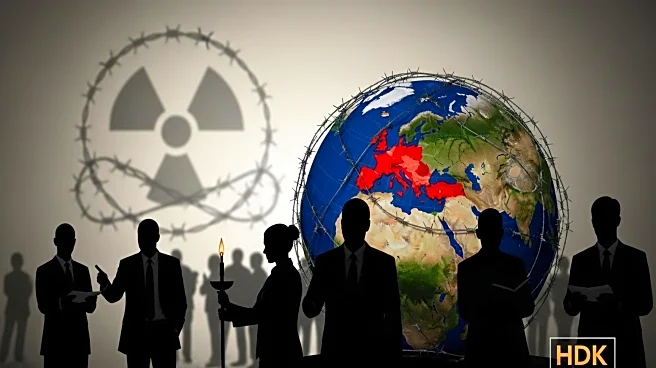What is the story about?
What's Happening?
The United Kingdom, France, and Germany have reimposed sweeping United Nations economic and military sanctions on Iran, ten years after they were initially lifted following the landmark nuclear deal known as the Joint Comprehensive Plan of Action (JCPOA). This decision comes as the European nations activated the 'snapback' mechanism, citing Iran's continued nuclear escalation and lack of cooperation with the International Atomic Energy Agency (IAEA). Iran had suspended inspections of its nuclear facilities, a legal obligation under the 2015 deal, following bombings by Israel and the United States on several of its nuclear sites and military bases. Iran's President Masoud Pezeshkian has insisted that the country has no intention of developing nuclear weapons, describing the reintroduction of sanctions as 'unfair, unjust, and illegal.' The JCPOA was initially designed to limit Iran's nuclear capabilities while allowing the development of its nuclear power infrastructure.
Why It's Important?
The reimposition of sanctions on Iran is significant as it marks a setback in diplomatic efforts to manage Iran's nuclear ambitions and stabilize relations between Iran and Western nations. The sanctions could further strain Iran's economy and exacerbate regional tensions, particularly with Israel and the United States. The decision underscores the challenges in maintaining international agreements when parties perceive breaches or threats. For the U.S., this development may impact foreign policy strategies in the Middle East, potentially influencing military and diplomatic engagements. The sanctions also highlight the ongoing complexities in nuclear non-proliferation efforts, with implications for global security and diplomatic relations.
What's Next?
European allies hope to continue negotiations to de-escalate tensions, urging Iran to refrain from further escalatory actions. Talks between the European nations and Iran have so far failed to produce a deal that would delay the sanctions. Iran has warned that any actions undermining its rights and interests will face a firm response, and President Pezeshkian has softened threats of quitting the Non-Proliferation Treaty but warned that sanctions could jeopardize negotiations. The situation remains fluid, with potential diplomatic engagements and further international responses likely to unfold.
Beyond the Headlines
The reimposition of sanctions on Iran raises ethical and legal questions about the enforcement of international agreements and the balance between national sovereignty and global security. The situation may also influence long-term shifts in regional alliances and power dynamics, particularly in the Middle East. The role of international bodies like the IAEA in monitoring and verifying compliance with nuclear agreements is crucial, highlighting the importance of transparency and cooperation in global governance.















